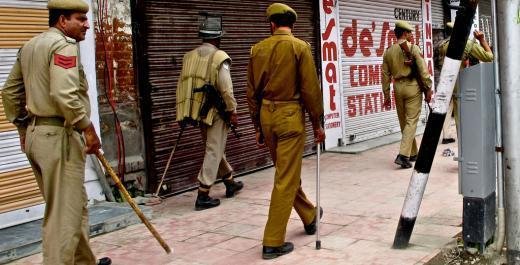SRINAGAR, India (GPI)-- Nazir Ahmad Matta, a resident of Srinagar, the summer capital of Indian-administered Kashmir, was detained under the Jammu and Kashmir Public Safety Act during October 2012. Authorities alleged that he stole a car among other activities prejudicial to public order. They booked him under the controversial act, which critics say enables authorities to detain people for extended periods without charges or a trial.
Matta, a laborer who maintains that he’s innocent, is still in detention at Central Jail Kotbhalwal Jammu in Jammu and Kashmir state. His wife, Sheebu Akther, is trying to get him released. She has consulted a lawyer, but Matta’s grandfather disagreed. “I told Matta’s grandfather that [an] advocate charges 10,000 rupees ($180) for pleading the case and even offered to pay half the amount,” she says. “But he didn’t agree and asked me to wait [until] he is released on his own.” Akther’s lawyer, Ghulam Nabi Shaheen, former general secretary of the Jammu and Kashmir High Court Bar Association, a voluntary association of lawyers, says that if Matta hadn’t been detained under the Public Safety Act, he would have been charged under section 379 of the Ranbir Penal Code, the state equivalent to the Indian Penal Code. This section governs car theft, with punishments ranging from three years to six years in jail and fines, if proven guilty. “He should have been prosecuted before court,” Shaheen says, “and, if his guilt was proved, then [the] court would have sentenced him.” Instead of providing Matta a fair trial, authorities put him directly into detention, which means he has already been punished for an offense he has not been proven guilty for, Shaheen says. “Simply, this is abuse of power,” he says. The Public Safety Act has long been controversial, with local and international critics citing extensive detention periods without charge, trial or legal resources. Last year, the state amended the act, which it insists is necessary to ensure public order and state security after conflict in the region. The government amended the act in 2012, but Amnesty International and Kashmiris alike say the changes aren’t enough and call for its repeal. The Public Safety Act came into force in Jammu and Kashmir in 1978. It permitted people to be detained for activities deemed prejudicial to the security of state or public order for up to two years without charge, trial or legal resources, Shaheen says. An anti-India armed insurgency broke out in the region in 1989, leading to two decades of conflict. The number of people detained since then under the Public Safety Act varies depending on the source. S.M. Sahai, chief of police in the Kashmir Valley, one of three divisions in the state, acknowledged that around 15,600 people in the valley have been detained under the Public Safety Act without charge or trial during the last two decades, according to Amnesty International’s October 2012 report, “Still A ‘Lawless Law.’” Meanwhile, the state government maintains that about 3,400 people have been booked under the act during the past two decades in seven of the Kashmir Valley’s 10 districts, according to its response to a Right To Information application – which allows citizens to legally obtain government records – submitted by Jammu Kashmir Coalition of Civil Society, a human rights group. Chief Minister Omar Abdullah informed the State Assembly during March 2012 that at least 1,332 people have been booked under the act during the last three years in the state. Shaheen calculates that there were more than 250 detentions under the act from January to October 2012.















